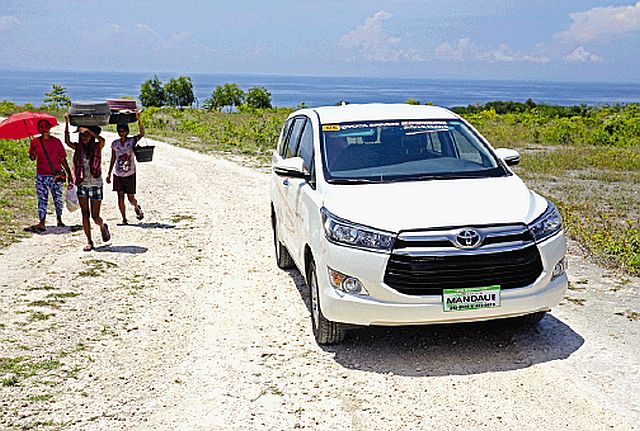
A group of locals pass by the all-new Toyota Innova in Borbon town, northern Cebu. (CDN PHOTO/LITO TECSON)
We checked out the fuel efficiency of the all-new Toyota Innova MPV
By now, most of us should have seen the newly released second-generation Toyota Innova multipurpose vehicle either displayed in Toyota Cebu dealerships or traversing the streets of Cebu.
We’ve witnessed how much it has improved from its successful predecessor with its more impressive styling, convenient features and elegant interior layout.
We should also know by now that the Innova does have an all-new engine, one that Toyota boasts of as being more fuel efficient than the previous model despite being a bigger 2.8-liter power plant compared to the 2.5 liter engine of the first generation’s.
But Toyota Cebu, through the efforts of Jose Manuel “Dodo” Cuenco, didn’t want to just rely on fuel economy tests conducted by Toyota and the Department of Energy to prove this claim. It actually went the extra mile and asked the Cebu media, including Cebu Daily News, to do its own evaluation last week.
So after a short talk with Mr. Cuenco at the Toyota Cebu Mandaue South dealership, we were off with a white pearl G variant and some cash for an entire week’s fuel supply.
Our mission for the week was to test the 1GD-FTV model, 2.8-liter double overhead camshaft four-stroke common rail direct injection diesel engine in different driving conditions. We were to try it in the city and highway, both in eco driving mode and normal driving mode. There was also an option to go power mode (choosing different driving modes is possible only in G and V variants) but we opted not to, for safety reasons.
The Innova gave us a 15.46 km/l consumption in our trip to Borbon, Cebu despite experiencing heavy traffic in the towns of Liloan and Compostela. (CDN PHOTO/LITO TECSON)
So after topping up the fuel from the dealership and resetting the trip meter to zero, we immediately put to the test, in eco mode, the engine that produces a maximum of 168.6 horsepower and 360 newton meter of torque in the city. After running 106 kilometers through the traffic congested roads of the cities of Mandaue and Cebu, we gassed up and the meter read 13.01 kilometers to full tank. That meant the car consumed a liter of fuel every 8.14 kilometers.
We reset the trip meter to zero and, using normal driving mode, cruised through the city for another day, most of the time with seven people on board.
Since this was normal driving mode, the engine settings didn’t hold back any use of power, meaning when we floored the accelerator, the Innova dutifully responded. And yes, this engine can accelerate quick off the line. During this run, we got mired in a couple of traffic jams along AS Fortuna in Mandaue City and Mabolo in Cebu City. When the meter read 116.8 kilometers, we filled it up again. This time, we consumed 14.67 liters of diesel or 7.96 km/l consumption.
The highway runs were done in a trip to Borbon town, northern Cebu with photographer Lito Tecson and his daughter. Again, using the same methods, we came up with a reading of 12.1 km/l on normal driving mode and 15.46 km/l on eco mode.
Photographer Lito Tecson takes photos of the Innova in a mountain barangay in Borbon.
The numbers that we put down may be a far cry from the claims of DoE and Toyota with their own tests but it should be noted that our tests were done without restrictions. We drove it most of the time with at least four people on board and through the daily traffic grind in the cities of Cebu and Mandaue. Even our highway runs didn’t free us from heavy congestion as we ran into a couple in the towns of Compostela and Liloan.
At the end of the week-long, test we could attest that this new engine has indeed improved by leaps and bounds compared to the previous model.
We wondered what changes were made and Toyota gladly gave us some answers. It said the new model has a thermal combustion efficiency of 44 percent. This means that less energy is lost due to heat dissipation.
Toyota also said the new engine has a new combustion chamber design which ensures air is completely burned during combustion for better burning of fuel and greater efficiency. There’s also the reduced engine friction and the upgrade to the use of a variable nozzle turbocharger with an intercooler whereas only an ordinary turbo was used in the old engine. Lastly, the automatic transmission is now six-speed, allowing the engine to operate at a low RPM range even at high speeds.
Now with a fuel-efficient engine, a totally cool exterior styling and convenient interior features, we’re sure the Innova will continue to dominate the MPV segment.